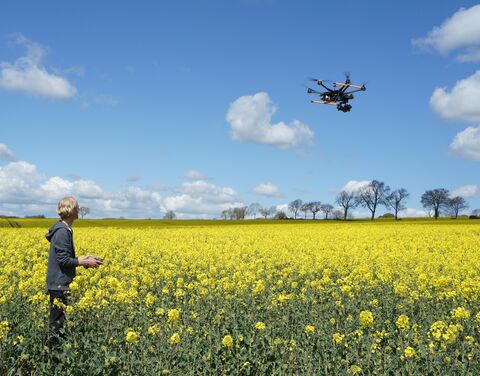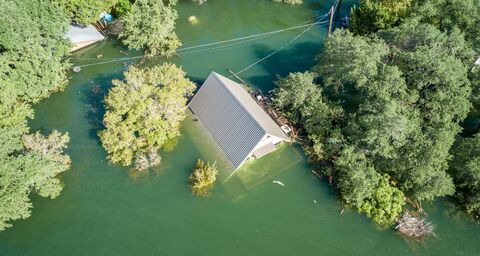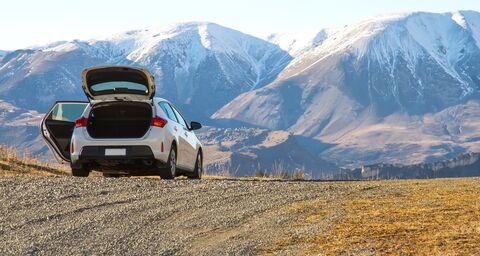
Five tips on flying and insuring drones
What's changed with the new law on drones? Do drones need to be insured? What about data protection? There are a few things you need to know if you want to fly a drone safely and legally. We've put together the most important tips for drone enthusiasts.
Do you already own a drone, or are you thinking about buying one? If so, you can find all the information you need to stay out of trouble here. Being prepared is half the battle. Once you've familiarized yourself with the law and got your insurance, you'll be ready to take off and enjoy flying with peace of mind.
1. Comply with the law: checklist before getting started
Switzerland adopted the European Union (EU) regulations on drones with effect from January 1, 2023. This brought a lot of changes as regards operating drones in Switzerland. You can find all you need to know in the FAQ on EU drone regulations on the Federal Office of Civil Aviation (FOCA) website.
Most privately owned drones fall under the open category, which means that they don't need to be authorized by the FOCA. However, you still need to meet various requirements to ensure that you're flying legally. You're ready for takeoff if you can answer "yes" to each of these seven questions:
- Are you at least 12 years old (or flying under the supervision of someone who is at least 16 years old and meets all the requirements below)?
- Have you registered as a drone operator (tip: create a CH-Login first)?
- Do you have a drone pilot certificate?
- Do you have personal liability insurance with an insured sum of at least CHF 1 million (see final paragraph for insurance details)?
- Does your drone have a CE mark?
- Is your UAS operator number clearly displayed on your drone?
- Are you familiar with the area you're flying in and aware of any flight restrictions?
Does your drone have to be registered?
Yes. You actually need to register yourself as a drone operator rather than your drone as such. This became mandatory on January 1, 2023. You can register for free. You're only exempt from registration if your drone weighs less than 250 grams and isn't equipped with a camera, microphone or other recording device.
Is the drone test mandatory?
Yes, unless your drone weighs less than 250 grams, in which case the test is voluntary but still recommended. In all other cases, drone pilots must have a certificate from September 2023. The certificate is valid for five years in Switzerland and throughout the EU. The exact training and test needed depend on the subcategory and weight class of your drone. The training and test are free of charge until further notice.
Do I need authorization to operate my drone?
That depends. Drones weighing less than 25 kilograms don't need authorization for normal operation. Authorization is needed for special situations such as the following: flying over large crowds of people, flying in built-up areas (drones weighing more than 900 grams), and flying with goggles (without an observer who has a direct line of sight to the drone). FOCA authorization is also mandatory if you're operating drones to make deliveries. In general, authorization is needed if it isn't possible to comply with all of the rules on drone operation.
2. Keep your drone under control: what are the rules on safety?
Line of sight: You must be able to see your drone at all times. Note that using binoculars or VR goggles explicitly DOES NOT count as having a line of sight. Here you need another person to watch over the airspace who can take control of the drone at any time if needed. Alternatively, you can request a special authorization from the FOCA.
Maximum altitude: In the open category, you aren't allowed to fly more than 120 meters above the ground. You can fly over artificial obstacles that are taller than this if you have the owner's permission.
Safe distance: Take care around people, animals, buildings, and other objects. Keep a safe distance, and be considerate. For each category, there's a minimum horizontal distance you must keep from uninvolved third parties.
Maintenance: Always keep your drone and related equipment in good working order, and only take off with a full battery.
Weather: Check the weather forecast and plan your flight accordingly.
3. Respect no-fly zones: where are you (not) allowed to fly?
Flying over people: Drones are only allowed to fly over crowds of people with authorization from the FOCA. Drones weighing more than four kilograms are not allowed to fly over any uninvolved third parties.
No-fly zones: Restricted zones are defined in Switzerland, mainly around civilian and military airfields, but also around prisons and nuclear power stations, for example. Flying drones over nature reserves (such as bird sanctuaries) and national parks is also prohibited. Different restrictions apply to the various types of restricted zone.
4. Respect other people's privacy: drones and data protection
Do your neighbors complain when your drone flies low past their home? That's understandable. No one wants to be listened to, photographed or filmed in their own garden. With this in mind, you should talk to your neighbors first before flying around your home. Surveillance by private individuals using drones is a sensitive topic that you need to keep in mind as a drone pilot because you're subject to the Federal Act on Data Protection (FADP) – and that applies to all personal data. For instance, every individual owns the rights to his or her own image in Switzerland, meaning that you need the permission of any person who can be clearly identified on your recording.
Code of Conduct for drone pilots
A clear majority of Swiss people don't think flying drones is an appropriate leisure pursuit, citing noise, surveillance, and accidents among their reasons. To increase acceptance, the Swiss Federation of Civil Drones calls on drone pilots to fly with the utmost care and respect.
5. Insure your drone: what's mandatory, what's voluntary?
Generally speaking, you can get insurance for two things: damage to third parties or their property under your personal liability insurance, and to the drone itself if it gets lost, stolen or damaged. Liability insurance is mandatory for all except the smallest drones. You can also choose to insure your drone against accidental damage.
- Liability insurance: By law, anyone flying a drone that weighs 250 grams or more needs personal liability insurance with an insured sum of at least one million Swiss francs. Note that privately operated drones in the open category that weigh up to 25 kilograms are normally covered by household insurance, provided the applicable requirements are met.
- Property insurance: You don't need special drone insurance to protect your equipment. It can be covered for damage, theft or loss either under your household contents insurance or under a separate policy for electronic devices. The latter not only insures the drone itself, but all the consumer electronics in your home. It also applies outside the home and abroad.
- Engineering insurance: If you use a drone commercially rather than privately, you can cover it for damage under engineering insurance.
If you cause damage to a third party and don't have liability insurance, you'll have to pay the resulting costs yourself. This can quickly become expensive, especially in cases of personal injury. You also risk a fine if your drone weighs 250 grams or more because the law requires you to have liability insurance. Note that, if you have insurance but don't fly within the law (for instance without a certificate), your insurance might not pay out when you make a claim.






